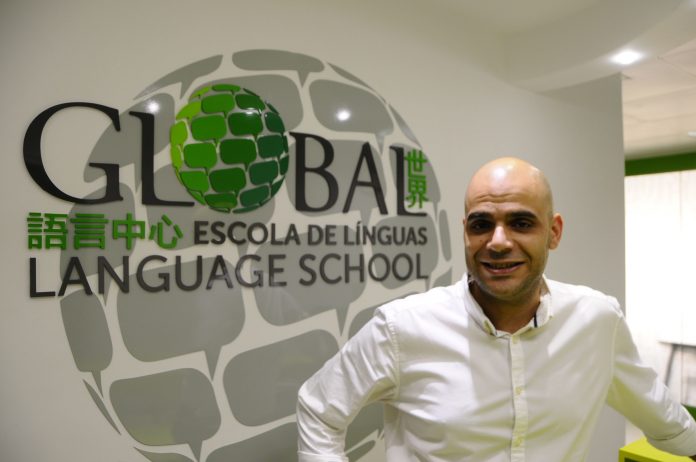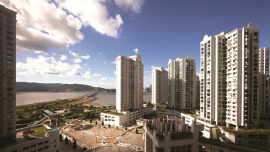An increasingly international environment and the desire to seek out new opportunities are driving more people to take up foreign languages, says João Varela, Director and Head of Global Language School in an exclusive interview. Varela points out the importance of Portuguese, English and Mandarin in the city, and the advantages to foreigners who study Cantonese. Varela also highlights the difficulties of running a language school in the MSAR, such as high rents and the need to hire experienced teachers.
When did Global Language School open?
It was established in October 2015. I and another shareholder have learnt from our life experience as we are both very connected to the multi-lingual community in Macau. This community has a strong feeling of belonging here. People have children in Macau and they want their children to be proficient in languages such as Chinese, Portuguese and English.
How did you come up with the idea to open a language school?
We started to develop this idea, in very slow motion, because we had to be careful. It was a huge investment for us but it has been going well. And we see more people have enrolled in language schools in the city.
Do you think the city’s Continuing Education Subsidy Scheme has boosted student enrolment at your school?
Of course, it really does. It is the purpose of it. The majority of our adult students have used the subsidy from the government to subsidize their school fees and they can basically learn a new language skill for free. The allowance pretty much covers the full course fee. It’s not only the subsidy, it’s also [based on] the will of people who feel a strong sense of belonging to the city. Especially, we found that parents are really opening up their minds to the need for their children to have foreign languages abilities.
What is the most popular language class?
Definitely our Cantonese course is very popular. The second most popular is the Portuguese course for Chinese children. English courses are also on rise. For people who live and work here, they want to know Cantonese for work and life in Macau. In addition, we have been teaching students from different countries around the world. People are looking for different Mandarin, Portuguese and Cantonese courses. We have American, Australian, French, Filipino, and Portuguese individuals who study Cantonese here.
How much does it cost for a course at your school?
We don’t charge expensive prices. It varies, as we don’t have a fixed price. On average, per hour it ranges from MOP100 (US$12.5) to MOP300 per hour. It depends on the language, schedule, the size of our classroom, and the age of the students. But our common prices are from MOP100 to MOP150. If you want to have a one-on-one class here, it is more costly, at MOP300 per hour.
Do you see a market in Macau for parents who want to send their children to learn foreign languages at a young age?
Yes, there is a market, but it is a secret because we are almost the only ones doing this. Of course, there is.
What do you think about the education system in Macau?
It is a reality that no one can deny: the majority of students in their late teens leave high school without having a great command of foreign languages, even English. But I don’t think the problem is only with the schools. It is the city itself. The Portuguese administration never cared about the importance of having people speaking more than one language before. It was either Portuguese or Chinese. People who spoke two languages had to do so from their own efforts to learn outside school.
What do you think about peoples’ attitudes to learning more than one language now?
The government is also trying to change its attitude. I think it is a matter of education at home and attitude. People have a great resistance in Macau to whatever foreign thing it is or whatever comes from abroad. They have a great resistance to that. I don’t know why. It should be studied. It is not just the schools to blame. They are just following what people are willing to do. I think the society is changing bit by bit towards learning foreign languages.
Do you think Macau can be a multi-lingual city?
The public transportation you can see nowadays already shows three languages. The public administration shows that they really care now to have everything in Portuguese and Chinese. I think they should also slowly make it in English as well because there is no international city without English. People may question how you are going to be an international city and the bridge between China and Portuguese-speaking countries. There is no way that we can be an international city if no one is able to speak in English. I think people should demand more from the government or the authorities of the education system, and put their children at an early age to learn other languages in an efficient, consistent and proven way.
What challenges have you faced in operating the school?
Until we opened it, we were a little bit afraid as we were waiting too long to be confirmed to establish the school. But it was confirmed eventually. It took a lot of time for us to get the licensing done. On the administrative side, I believe that was our main difficulty. During the waiting period, we still had to pay salaries and rent. There is a problem that exists in every department of the government administration in Macau. It is not just a problem of the Education Department. This really doesn’t help businesses in getting licensing. The procedures are very slow. The things they demand in the application, not only in the education sector – if you go to restaurants, hotels, bars, shops [it’s the same] and that really makes it difficult for businesses to survive. The government needs to do something to improve that.
Do you find it difficult to hire teachers in Macau?
It is extremely difficult to hire teachers in Macau. As a language school, our main concern is to find people who are really experienced in teaching languages to foreigners. You can have a bachelor degree in Portuguese literature or a PhD in English literature or Chinese language history. But if you’ve never taught before, you don’t know how to teach. Teaching languages to foreigners is even more demanding and challenging than teaching the ones who have spoken these languages as their mother tongue since they were born. Our main difficulty is that there are not many experienced teachers here. We are training our own teachers. We hire local people. We do everything we can to keep this a local language school for the Macau people.
What do you offer that is different from other language schools in the city?
We offer flexible schedules and modern classes. You can either study in the morning, during lunchtime, afternoon or evening. We have come up with a system that allows us to have an opportunity to offer students a time to study in their free time. That comes at a price as well. If the students want to have a class at any given time, of course, the price is a little bit different at different times, but the fact is that we have these options for them to choose from. People can study at whatever time they want. We are even developing a system of e-learning which will be announced by the beginning of next year.
What is the modern way of teaching?
The content we use in our Cantonese course teaching to foreigners is the matter of how you express yourself. It is about getting the right words for the right place. However, the traditional way of teaching Cantonese or Mandarin is spending hours to know the tones and making people feel bored learning things. We try to make it more pragmatic to real life, for instance: something that they have learned and can be used in real life. This is how we approach the teaching here. We don’t focus so much on the tones or the correct structure, but on the expression of the language. Also, we don’t focus so much on writing because people are more willing to learn how to speak and how to communicate.
Do you offer classes to other organizations?
We are developing programmes to cooperate with companies to teach their staff Mandarin. We also offer business language courses. That is really what people are looking for. We have some associations and companies that ask us to send our teachers there and teach English and Cantonese courses to their staff. Mostly the hospitality companies want their staff to learn Chinese as most of the restaurants hire Filipinos who cannot speak Chinese. It is a good investment for these companies to have a class that costs them almost nothing compared to their volume of business, by having their staff learn basic Cantonese for work.
Do you face any competition?
Of course we do and it is very healthy. Most of the city’s language schools have been established for a long time – such as English for Asia. It teaches children English and it does it very well. There is no way I can compete with them and I don’t want to compete with them because I don’t want them to compete with me. Our approach is to not necessarily only teach the language. We always have this worry of why people want to learn a language. This comes with two answers: the necessity of learning languages and using language as an instrument for communication. So we are trying to think about what people try to use language skills, then we combine language and the use of the language. We want to teach language to our students so that they can use it in their daily life.
How do you promote your business?
We have three ways of promoting. Of course, firstly, we promote on Facebook. Secondly, we give out leaflets on the street from time to time. Thirdly, it is through word of mouth. People have a good opinion about us and spread the word.
Why did you choose this location, right in the city centre of Macau, for your language school?
The location is extremely good. It was very hard to find at the beginning. It was not because there was no empty space in Macau. Rent is extremely high in Macau especially for a central location of our language school. It is an investment. The location is very close to several schools in the city. We are also near places where the parents and the public workers work.
Do you receive any government subsidy for your language school?
It is only for the non-profit associations. There are two possible ways to open an educational centre like ours. One is completely private, with a profit objective – which is us. We are a profit seeking organization. Another one is non-profit organization and also private. The latter one can receive benefits from government subsidies and allowances. We didn’t establish our school as a non-profit but it doesn’t mean that we don’t need government subsidies. For the time being, we want to try as a completely private company that can still work properly without depending on the government. Of course, we indirectly benefit from it as well, with 80 per cent of our adult students using the government allowance of MOP6,000 to pay for their courses.
Do you have any future plans?
We have a plan. In the business world like this in Macau nowadays, the main plan is to maintain the location because the rent flies high. Landlords don’t always understand this and it is our main worry. Everything else we may have planned or may plan could drown due to high rent. It is really our main concern to maintain a consistent business and allow improvements step by step in our business.
























